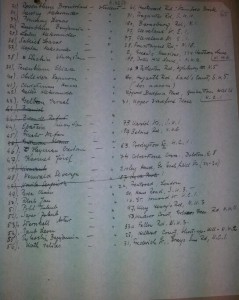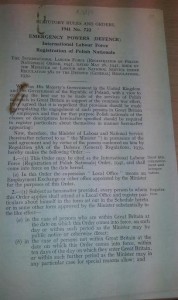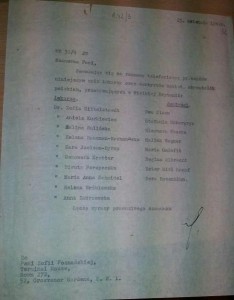[:en]I’ve spent a lot of time examining documents illustrating the development of Polish community in Britain in the last century. Amongst hundreds of documents, I found a few that really interested me.
First of all, there are a vast number of documents related to the Polish students receiving their education from various British universities. They are mainly lists of students’ names and description of their performance 1926 – 1942). They are all arranged in a subject order, starting with Dr Charles Poznanski’s letter to Miss Arminella Housell from Polish Research Centre: “I think it is also a matter of great satisfaction to find that the young people themselves are providing worthy of the opportunities offered them by an Allied country…” (30th July 1941). I have also found a written copy of the list of Polish students staying in London at that time (below):  Secondly, I was amazed by the amount of records from proving activities of the Polish Relief Fund based at 10 Grosvenor Pl, London SW1 at that time. The organization aimed at bringing financial relief to Polish students. I have also come across a leaflet printed by the Emergency Powers (Defence) aimed at the International Labour Force in 1941 ordering Polish immigrants to register in order to fight for Britain during the WWII struggle.
Secondly, I was amazed by the amount of records from proving activities of the Polish Relief Fund based at 10 Grosvenor Pl, London SW1 at that time. The organization aimed at bringing financial relief to Polish students. I have also come across a leaflet printed by the Emergency Powers (Defence) aimed at the International Labour Force in 1941 ordering Polish immigrants to register in order to fight for Britain during the WWII struggle.  In addition, I found a letter addressed to Zofia Poznanska asking to approve and grant rights for Polish doctors and dentists to practise their profession in Britain:
In addition, I found a letter addressed to Zofia Poznanska asking to approve and grant rights for Polish doctors and dentists to practise their profession in Britain:  There were also a series of letters and articles dedicated to this case. In one of these letters a group of anonymous Polish doctors asked the British government to allow Polish doctors and dentists to support the public. According to that letter a great number of them would have been satisfied with the rights to attend refugees and work on the front. Furthermore, there was also a separate case of Polish-Jewish doctors and dentists (many women) who had to be able to show their certificates of registration with the Metropolitan Police at Bow Street branch in order to attend Polish refugees settled in East London[:pl]I have spent a lot of time examining various documents illustrating social development of Polish migrant community in Britain in the last century. Amongst hundreds of documents, I found a few that truly interested me.
There were also a series of letters and articles dedicated to this case. In one of these letters a group of anonymous Polish doctors asked the British government to allow Polish doctors and dentists to support the public. According to that letter a great number of them would have been satisfied with the rights to attend refugees and work on the front. Furthermore, there was also a separate case of Polish-Jewish doctors and dentists (many women) who had to be able to show their certificates of registration with the Metropolitan Police at Bow Street branch in order to attend Polish refugees settled in East London[:pl]I have spent a lot of time examining various documents illustrating social development of Polish migrant community in Britain in the last century. Amongst hundreds of documents, I found a few that truly interested me.
First of all, there are a vast number of documents related to the Polish students receiving their education from various British universities. They are mainly lists of students’ names and description of their performance 1926 – 1942).
They are all arranged in a subject order, starting with Dr Charles Poznanski’s letter to Miss Arminella Housell from Polish Research Centre:
“I think it is also a matter of great satisfaction to find that the young people themselves are providing worthy of the opportunities offered them by an Allied country…” (30th July 1941).
I have also found a written copy of the list of Polish students staying in London at that time (below):
Secondly, I was amazed by the amount of records from proving activities of the Polish Relief Fund based at 10 Grosvenor Pl, London SW1 at that time. The organization aimed at bringing financial relief to Polish students.
I have also come across a leaflet printed by the Emergency Powers (Defence) aimed at the International Labour Force in 1941 ordering Polish immigrants to register in order to fight for Britain during the WWII struggle.
In addition, I found a letter addressed to Zofia Poznanska asking to approve and grant rights for Polish doctors and dentists to practise their profession in Britain:
There were also a series of letters and articles dedicated to this case. In one of these letters a group of anonymous Polish doctors asked the British government to allow Polish doctors and dentists to support the public. According to that letter a great number of them would have been satisfied with the rights to attend refugees and work on the front.
Furthermore, there was also a separate case of Polish-Jewish doctors and dentists (many women) who had to be able to show their certificates of registration with the Metropolitan Police at Bow Street branch in order to attend Polish refugees settled in East London
[:]
